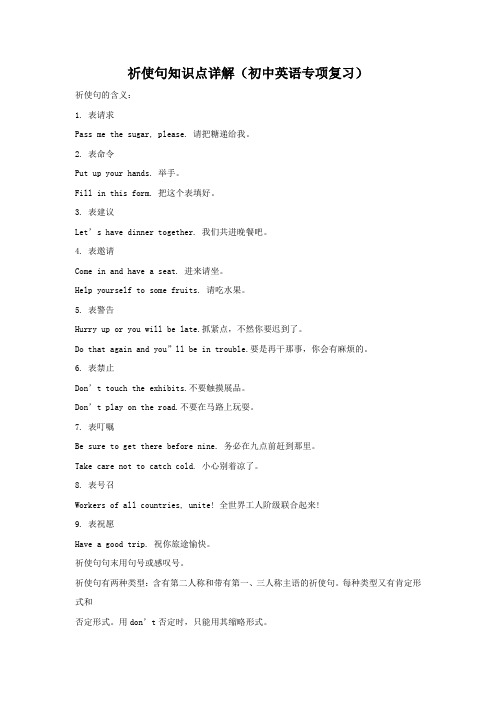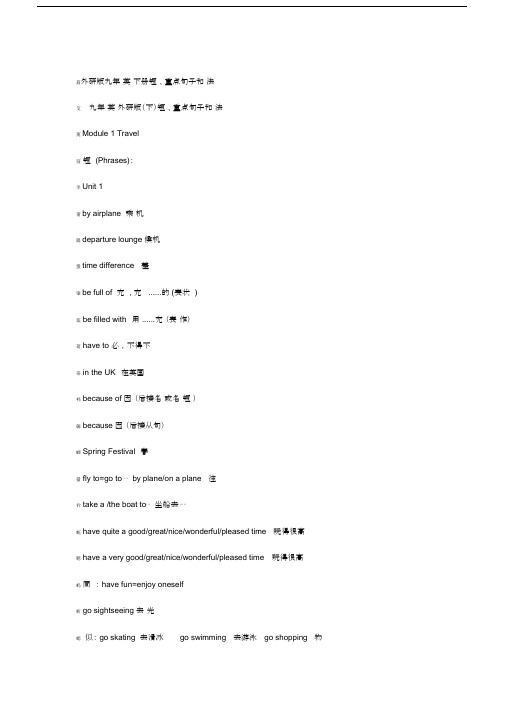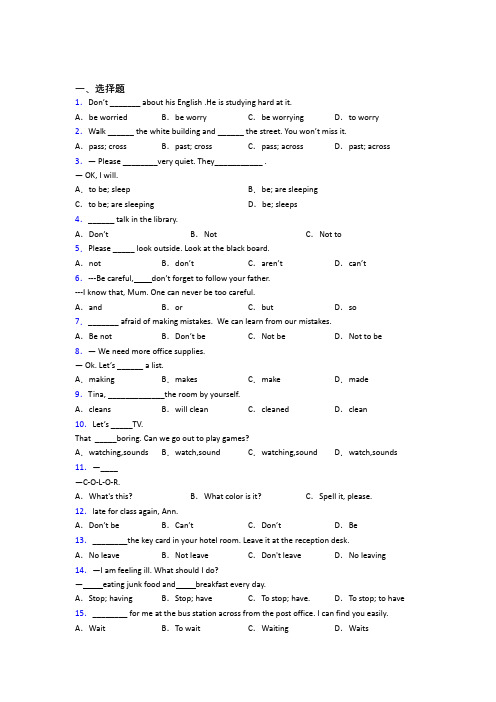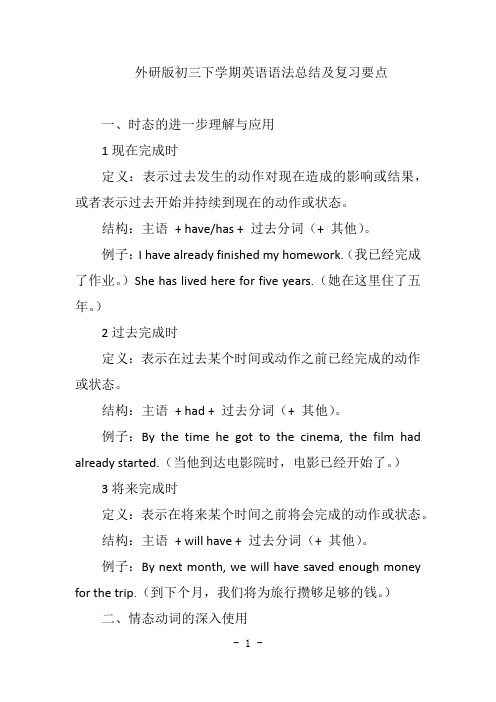九年级英语下册 祈使句语法复习 外研版
祈使句知识点详解(初中英语专项复习)20

祈使句知识点详解(初中英语专项复习)祈使句的含义:1. 表请求Pass me the sugar, please. 请把糖递给我。
2. 表命令Put up your hands. 举手。
Fill in this form. 把这个表填好。
3. 表建议Let’s have dinner together. 我们共进晚餐吧。
4. 表邀请Come in and have a seat. 进来请坐。
Help yourself to some fruits. 请吃水果。
5. 表警告Hurry up or you will be late.抓紧点,不然你要迟到了。
Do that again and you”ll be in trouble.要是再干那事,你会有麻烦的。
6. 表禁止Don’t touch the exhibits.不要触摸展品。
Don’t play on the road.不要在马路上玩耍。
7. 表叮嘱Be sure to get there before nine. 务必在九点前赶到那里。
Take care not to catch cold. 小心别着凉了。
8. 表号召Workers of all countries, unite! 全世界工人阶级联合起来!9. 表祝愿Have a good trip. 祝你旅途愉快。
祈使句句末用句号或感叹号。
祈使句有两种类型:含有第二人称和带有第一、三人称主语的祈使句。
每种类型又有肯定形式和否定形式。
用don’t否定时,只能用其缩略形式。
例如:Welcome to Beijing Park.Walk about three blocks.Don’t mention it.无动词祈使句在请求、命令和口号中,常用无动词祈使句,它实际上是省略了动词,从而使语句更简洁或有力。
如:Just a minute, please! 请稍等!This way, please! 请这边走!Attention! 立正!Up the stairs! 上楼!To the playground, everyone of you! 到操场上去,你们每个人都得去!在一些指示牌上,常用“No +动名词/名词”构成简略式的否定祈使句。
外研版新九年级英语下册短语、重点句子和语法.docx

葿外研版九年英下册短、重点句子和法芆九年英外研版(下)短、重点句子和法薁Module 1 Travel莂短 (Phrases):芈Unit 1莆by airplane 乘机羂departure lounge 候机螀time difference 差肇be full of 充 , 充 ......的 (表状 )蒅 be filled with用......充(表作)莃 have to 必,不得不蒂 in the UK在英国袆 because of 因(后接名或名短)薅 because 因(后接从句)螄 Spring Festival春羀 fly to=go to ⋯ by plane/on a plane 往衿 take a /the boat to⋯坐船去⋯⋯蚅 have quite a good/great/nice/wonderful/pleased time玩得很高羁 have a very good/great/nice/wonderful/pleased time玩得很高蚂同: have fun=enjoy oneself蚈 go sightseeing 去光螅似: go skating 去滑冰go swimming去游泳go shopping 物莂take a tour 旅行肀by coach 乘客莇the Summer Palace 和园螅go for a long walk 去散步螃had better do 最好做 ---袁at the end of 在⋯⋯末 /尽(后接)蒀by the end of 到⋯⋯止(后既可接又可接地点)袅plenty of 大量膃the school leavers’party 会艿take place 生膈 look forward to盼望,期待羅Unit 2薄with tears in one ’ s eyes 眼里含着泪水羁dream about 梦羇in front of 在 ---前面 (外部 )肅in the front of 在 ---前面(内部)蚁 set off 出,身葿似: set out 出,身set about 开始,着手set down 放下,写下set free 解放,放螆 set up 开,,立set to 毅然开始set on 突然攻,膄forget to do sth. 忘去做某事肂 forget doing sth.忘做某事膁 be unable to do 不能做 ---蝿at the start of 在 --- 的开端芄hold sb in one ’s arm 抱住某人蒃push sb away 推开虿write to sb. 写信某人薈as soon as 一 ---就 ---莄jump onto 跳到 ---上袄push past sb莁a pair of 一双 / /副表示的是成的西,是指两个不分开使用的西。
新外研版九年级英语下册语法

九年级英语下册语法一、unless的基本用法连词unless意为“除非……如果不……”,“除了……”,多引导一个否定意义的真实条件句,有时也可引导非真实条件旬。
unless引导条件句时,主要用于下列情况。
(1)主句为肯定句。
如:Unless I visit every bookstore in town.I shall not know whether I can get what l want.如果我不到城里每一家书店去看看,我就不知道是否能买到我想要的书。
You will miss the bus unless you hurry up.你要不快点就会错过班车。
You’ll fail in chemistry again unless you work harder.如果你不再加把劲,你化学考试还会不及格。
(2)主句为否定句。
如:Unless you oil the motor regularly.it won’t run smoothly.要不是你经常给发动机上油。
它就不会转得那么顺畅。
I wouldn't be saying this unless I were sure of the facts.要是我对这些事情没有把握,我就不说这话了。
You will never get anywhere unless you have set your goal.如果你不设定目标,你哪儿也去不了。
二、应注意的一些问题1.unless不能与if'"not换用的情况unless在意义上相当于if...not,因此在有些场合中unless与if...not可互换使用。
如:Unless I am mistaken.I’ve seen that man before.=lf I am not mistaken。
I’ve seen that man before.如果我没搞错,我以前见过那个人。
外研社九年级语法知识点

外研社九年级语法知识点语法是学习语言的重要组成部分,它规定了词语之间的关系和句子的结构。
对于九年级学生来说,掌握语法知识点是必不可少的。
本文将介绍外研社九年级语法知识点,帮助学生更好地理解和应用这些知识。
一、名词性从句名词性从句是指在句中充当名词成分的从句。
常见的名词性从句有主语从句、宾语从句、表语从句和同位语从句。
例如:1. 主语从句:What she said surprised me. (她说的话让我感到惊讶。
)2. 宾语从句:He asked if I could help him. (他问我是否可以帮助他。
)3. 表语从句:The problem is whether we should go or stay. (问题是我们是去还是留。
)4. 同位语从句:Her belief is that hard work pays off in the end. (她的信念是努力工作最终会有回报。
)二、动词的时态和语态动词的时态和语态反映了动作或状态发生的时间和动作的主体。
常见的时态有一般现在时、一般过去时、一般将来时等。
例如:1. 一般现在时:The sun rises in the east. (太阳从东方升起。
)2. 一般过去时:They played basketball yesterday. (他们昨天打篮球。
)3. 一般将来时:We will have a meeting tomorrow. (明天我们将开会。
)另外,英语中还有被动语态,用于表示动作的承受者或变化的主体。
例如:The window was broken by the strong wind. (窗户被强风掀破了。
)三、形容词和副词的比较级和最高级形容词和副词的比较级和最高级用于表示两者或多者之间的程度、大小或顺序。
常见的比较级有比较级、原级和最高级。
例如:1. 比较级:The weather today is hotter than yesterday. (今天的天气比昨天热。
外研社九年级下知识点

外研社九年级下知识点
在九年级下学期,外研社出版的教材主要涵盖了以下几个知识点:
1. 语法知识
九年级下学期的语法知识主要包括时态、语态、从句、被动语
态和虚拟语气等。
其中,时态是基础知识,要求学生正确运用一
般现在时、一般过去时、一般将来时等各种时态。
语态则主要包
括主动语态和被动语态的转换和运用。
此外,从句也是重点内容,如宾语从句、主语从句、定语从句和状语从句等。
虚拟语气则要
求学生掌握情态动词的用法和虚拟条件句的构成。
2. 词汇知识
九年级下学期的词汇知识主要覆盖了各个主题,如自然灾害、
环境保护、健康生活、社会问题等。
学生需要掌握这些主题相关
的词汇,并能够正确运用在语言表达中。
3. 阅读技巧
九年级下学期的阅读理解题主要考查学生的阅读理解能力和阅
读策略。
学生需要正确理解文章的主旨大意、段落结构和关键信息,并能够回答问题、推理判断和归纳总结等。
4. 写作技巧
九年级下学期的写作主要包括议论文、说明文、记叙文和应用
文等不同体裁。
学生需要运用各种写作技巧,如段落组织、观点
陈述、逻辑推理和描写细节等,使文章内容丰富准确、结构严谨。
5. 听力技能
九年级下学期的听力主要考查学生的听取关键信息、获取主旨
大意和理解细节等技能。
学生需要通过听力材料,准确捕捉语音
语调、识别出关键词汇和理解说话人的意图。
总而言之,外研社九年级下教材的知识点主要包括语法、词汇、阅读、写作和听力等方面。
通过系统学习这些知识点,学生可以
提高语言综合运用能力,加深对英语语言的理解和感悟。
初中英语语法知识—祈使句的知识点总复习附解析(4)

一、选择题1.Don’t _______ about his English .He is studying hard at it.A.be worried B.be worry C.be worrying D.to worry 2.Walk ______ the white building and ______ the street. You won’t miss it.A.pass; cross B.past; cross C.pass; across D.past; across 3.— Please ________very quiet. They___________ .— OK, I will.A.to be; sleep B.be; are sleepingC.to be; are sleeping D.be; sleeps4.______ talk in the library.A.Don’t B.Not C.Not to5.Please _____ look outside. Look at the black board.A.not B.don’t C.aren’t D.can’t6.---Be careful, don’t forget to follow your father.---I know that, Mum. One can never be too careful.A.and B.or C.but D.so7._______ afraid of making mistakes. We can learn from our mistakes.A.Be not B.Don’t be C.Not be D.Not to be 8.— We need more office supplies.—Ok. Let’s ______ a list.A.making B.makes C.make D.made 9.Tina, _____________the room by yourself.A.cleans B.will clean C.cleaned D.clean 10.Let’s _____TV.That _____boring. Can we go out to play games?A.watching,sounds B.watch,sound C.watching,sound D.watch,sounds 11.—____—C-O-L-O-R.A.What's this? B.What color is it? C.Spell it, please. 12.late for class again, Ann.A.Don’t be B.Can’t C.Don’t D.Be13.________the key card in your hotel room. Leave it at the reception desk.A.No leave B.Not leave C.Don't leave D.No leaving 14.—I am feeling ill. What should I do?— eating junk food and breakfast every day.A.Stop; having B.Stop; have C.To stop; have. D.To stop; to have 15.________ for me at the bus station across from the post office. I can find you easily. A.Wait B.To wait C.Waiting D.Waits16.Work hard, __________ you may not catch up with your classmates soon.A.but B.or C.and D.yet17.Work hard, ________ you’ll have a big success.A.and B.but C.or D.for18.__________ shouting, please! It's against the rules.A.Don't B.Not C.No19.—Nick, __________ the door when you leave the classroom.—All right. I will.A.to close B.closing C.closed D.close 20.—Millie,______ late for school again.—Sorry, I ______.A.don’t; am not B.won’t be; don’t C.don’t be; won’t D.won’t be; won’t 21.—Miss Green, would you please tell me how to improve my English?—_____ a study group, and you’ll get help from others.A.Join B.Joining C.To join D.If you join22.________an icon at the bottom of the page then ______, and you will get more information about the city.A.Picking, click it on B.Picking; click on it C.Pick; click it on D.Pick; click on it 23.Let's __________ tennis in the playground.()A.play B.to play C.plays D.to plays 24.Study hard, ________you ________pass the exam.A.and, won’t B.or, will C.or, / D.and, will25.We can’t get in. It says “________” on the sign.A.No smoking B.No touchingC.No entry D.No shouting【参考答案】***试卷处理标记,请不要删除一、选择题1.A解析:A【解析】【详解】句意:不要担心他的英语。
外研社九年级下知识点归纳

外研社九年级下知识点归纳九年级是初中的最后一年,在这一年里,我们学习了各种各样的知识,其中包括了许多重要的知识点。
今天,我想对外研社九年级下册的知识点做一个简单的归纳。
首先,我们来说说语法知识点。
在九年级下册,我们学习了很多复杂的语法结构,如虚拟语气、名词性从句、定语从句等等。
这些知识点对我们的英语学习非常重要,它们可以帮助我们更好地理解和运用英语。
其次,我们学习了一些地道的英语表达和习惯用语。
学会这些表达方式不仅可以让我们的口语更加地道,而且可以让我们更加容易与他人交流。
在学习这些表达方式时,老师还给我们介绍了一些和英语国家文化相关的知识,如节日习俗、饮食文化等等。
除了语法和口语表达,我们还需要掌握一些写作技巧。
在九年级下册中,我们学习了一些写作的基本要素,如标题、段落结构、使用连接词等等。
通过学习这些写作技巧,我们可以更好地组织我们的思路,写出更有逻辑性和连贯性的文章。
此外,阅读理解也是九年级下册的一个重点。
在这一年里,老师给我们提供了许多不同类型的阅读材料,如新闻报道、短文故事等等。
通过阅读这些材料,我们可以提高自己的阅读理解能力,培养自己的推理能力和批判性思维。
最后,我们还学习了一些文学作品。
在九年级下册,我们读了一些经典的文学作品,如《哈利·波特》、《了不起的盖茨比》等等。
通过阅读这些文学作品,我们可以培养自己的阅读兴趣,提高我们的文学素养。
九年级下册的知识点归纳如上所述。
这些知识点涉及了语法、口语表达、写作、阅读理解和文学作品等方面。
掌握这些知识点对我们的英语学习至关重要。
希望大家能够在学习中努力,不断提高自己的英语水平。
英语外研九年级下知识点

英语外研九年级下知识点英语外研九年级下学期的知识点主要包括语法、词汇、阅读理解等内容。
在这篇文章中,我将为大家详细介绍这些知识点,以帮助大家更好地学习和掌握英语。
一、语法知识1.动词时态英语中的动词时态有现在时、过去时、将来时等。
在使用动词时态时,要根据不同的情况来选择合适的时态。
例如:- 现在进行时:I am reading a book. (我正在读一本书。
)- 过去进行时:She was studying when I called her. (我给她打电话时,她正在学习。
)- 将来进行时:They will be playing football tomorrow. (他们明天将会踢足球。
)2.名词性从句名词性从句在句子中充当名词的作用,常见的有主语从句、宾语从句、表语从句和同位语从句等。
例如:- 主语从句:What you said is true. (你说的是真的。
)- 宾语从句:He asked me if I could help him. (他问我是否能帮助他。
)- 表语从句:The fact is that he didn't come. (事实是他没有来。
)- 同位语从句:I heard the news that they won the game. (我听说了他们赢得了比赛的消息。
)3.虚拟语气虚拟语气用来表达与事实相反的假设、愿望、建议等,常见的有虚拟条件句和虚拟语气表达的方式。
例如:- 虚拟条件句:If I were you, I would go abroad. (如果我是你,我会出国。
)- 虚拟语气表达的方式:I wish I could speak English fluently.(我希望我能够流利地说英语。
)二、词汇知识1.同义词与反义词同义词是指意思相近的词,而反义词则表示相反的意思。
通过学习同义词和反义词可以丰富词汇量,提高写作和阅读能力。
例如:- 同义词:big - large;happy - glad- 反义词:big - small;happy - sad2.词组与固定搭配词组是由两个或多个词构成的短语,固定搭配是由特定的词汇组合而成的一种表达方式。
外研社九年级下册知识点

外研社九年级下册知识点外研社九年级下册知识点主要包括语法、词汇和阅读理解等方面。
在本文中,我将为您详细介绍这些知识点以及它们在九年级英语学习中的重要性。
一、语法知识点1. 时态:九年级下册对时态的要求更加复杂。
除了常见的一般现在时、一般过去时和一般将来时外,还包括现在进行时、过去进行时、将来进行时等进行时态的运用。
2. 语态:九年级下册要求学生学会被动语态的基本用法,如一般现在时被动语态、一般过去时被动语态等,能够将主动句转换为被动句,并正确运用于写作和阅读中。
3. 定语从句:九年级下册要求学生能够理解和使用定语从句,并能够正确区分限制性定语从句和非限制性定语从句的用法。
4. 名词性从句:九年级下册要求学生能够理解和使用名词性从句,包括宾语从句、主语从句和表语从句,并掌握名词性从句的引导词和语序。
5. 虚拟语气:九年级下册要求学生学会运用虚拟语气表达假设、愿望和建议等,如虚拟条件句和虚拟语气的用法。
二、词汇知识点1. 同义词与反义词:九年级下册要求学生扩大词汇量,学会运用同义词和反义词,以丰富表达方式。
2. 词性转换:九年级下册要求学生能够将词语按照不同的词性进行转换,如名词转换为形容词、动词转换为名词等。
3. 构词法:九年级下册要求学生学会通过前缀、后缀和派生等方式构词,以拓展词汇量和加深对单词意义的理解。
三、阅读理解1. 短文理解:九年级下册的阅读材料更加复杂,要求学生能够准确理解文章主旨、段落大意和细节信息,并能正确回答相关问题。
2. 阅读策略:九年级下册要求学生学会运用不同的阅读策略,如猜词义、获得上下文提示等,以帮助理解和推测文章内容。
综上所述,九年级下册的外研社英语课程中,语法、词汇和阅读理解是重要的知识点。
掌握这些知识点对于学生的英语学习和应试能力提升具有重要意义。
希望通过本文的介绍,能够对外研社九年级下册的知识点有更全面的了解,并在学习和应用中取得进步。
外研版 初三下册全部重点短语和句型总结

外研版初三下册全部重点短语和句型总结In the second semester of the ninth grade in the Foreign Language Teaching and Research Press, there are many key phrases and sentence patterns that are essential for students to master in orderto improve their English proficiency. These include various expressions, phrasal verbs, idiomatic phrases, and sentence structures that are commonly used in daily communication and written expression. By understanding and practicing these key elements, students can enhance their language skills and become more fluent and confident in using English.在外研版第九年级下学期中,有许多关键短语和句型是学生必须掌握的,以便提高他们的英语水平。
这些包括各种常用的表达、短语动词、惯用语和句式结构,在日常交流和书面表达中常常使用。
通过理解和练习这些关键要素,学生可以提升他们的语言技能,变得更加流利和自信地运用英语。
For example, key phrases such as "make a difference", "be in charge of", "take one’s breath away", and "run out of" are commonly used in both spoken and written English. These phrases have specific meanings and nuances that may not be easily translated into otherlanguages, making them essential for students to learn and understand in order to communicate effectively in English.例如,“make a difference”、“be in charge of”、“take one’s breath away”和“run out of”等关键短语在口语和书面英语中都是常用的。
外研社九年级下册语法知识点

外研社九年级下册语法知识点在外研社九年级下册中,语法知识点是学生们需要重点掌握和运用的内容。
语法作为语言的基础,它的掌握对于学生的语言表达能力和写作水平的提升至关重要。
本文将以回顾九年级下册语法知识点为主线,结合例句进行解析,帮助读者更好地理解和运用这些语法知识。
一、动词形式的变化在九年级下册中,动词形式的变化是一个重要的语法知识点。
动词的时态、语态和语气等方面都会对动词的形式进行调整。
比如,一般现在时常用于表达客观事实和普遍真理,而一般过去时则表示过去发生的动作或状态。
同时,被动语态常用于表达动作的承受者而不强调执行者,这在科技领域的文章中经常出现。
例句:1. The earth revolves around the sun.(地球绕太阳旋转)- 一般现在时2. He finished his homework yesterday.(他昨天做完了作业)- 一般过去时3. The book was written by a famous author.(这本书是由一位著名作家写的)- 被动语态二、名词性从句在九年级下册中,名词性从句也是一个需要掌握的语法知识点。
名词性从句作为一个句子类型,可在主语、宾语、表语和同位语等动词功能部分进行替代。
通过使用名词性从句,可以使句子更加简洁明了,表达更加准确。
例句:1. What she said is true.(她说的是真的)- 主语从句替代名词2. I don't know where he went.(我不知道他去了哪里)- 宾语从句替代名词3. His dream is to become a doctor.(他的梦想是成为一名医生)- 表语从句替代名词4. The news that he won the competition surprised everyone.(他赢得比赛的消息让所有人都感到惊讶)- 同位语从句替代名词三、虚拟语气九年级下册中的虚拟语气也是一个需要注意的语法知识点。
外研版初三下英语常用语法知识——祈使句知识点总结(培优专题)

一、选择题1.— What does your best friend Amy look like?— ______A.She’s fine, thanks.B.She likes pandas best.C.She’s of medium height with long curly hair.D.She is like a sister to me.C解析:C【解析】【分析】【详解】句意:——你最好的朋友艾米长什么样?——她中等身高,留着长卷发。
考查特殊疑问句,A. She’s fine, thanks. 她很好,谢谢;B. She likes pandas best. 她最喜欢熊猫;C. She’s of medium height with long curly hair. 她中等身材,留着长长的卷发;D. She is like a sister to me. 她就像我的妹妹一样。
根据问句句意可知询问外貌,故选C。
2.—________ the population of your town?—About thirty thousand.A.What are B.How much is C.How many are D.What’s D解析:D【解析】【分析】【详解】句意:——你的城市的人口有多少?——大约三万。
考查疑问词辨析及主谓一致。
What are是什么;How much is是多少;How many are是多少;What’s是什么。
首先询问人口有多少应用疑问词What或者How large,而不是How many, How much,故排除B和C;这句话的主语中心词是population,表示抽象意义的“人口”,动词用单数,故选D。
3.They like playing football, ________?A.do they B.don’t they C.aren’t they D.are they B解析:B【解析】【分析】【详解】句意:他们喜欢踢足球,不是吗?考查反意疑问句。
初中英语语法知识—祈使句的知识点总复习含答案解析(3)

一、选择题1.“Sally, ________ afraid of making mistakes in your composition,” said the teacher. A.not be B.don’t be C.be not D.not to be 2.—When and where shall we meet tomorrow?—Let’s _______ it 3:00 p. m. at my home.A.do B.make C.meet D.plan3.______ talk in the library.A.Don’t B.Not C.Not to4.Don’t________ in the classroom. It’s important ________ quiet when you study. A.talk, keep B.to talk, keep C.talk, to keep D.to talk, to keep 5.The teacher often says, “ _____ late for school. ”A.Don’t B.Don’t be C.Not D.Doesn’t 6.Leave the E-dictionary behind,____ you won't be able to read independently.A.so B.or C.and D.but7._______ afraid of making mistakes. We can learn from our mistakes.A.Be not B.Don’t be C.Not be D.Not to be 8.— Study hard, _________ you will pass the exam.—I’m sure I will.A.so B.or C.but D.and9.___________really hard, and you can realize your dream of becoming an astronaut. A.Works B.To work C.Working D.Work 10.Tina, _____________the room by yourself.A.cleans B.will clean C.cleaned D.clean 11.Hurry up, _________ you will be late for class.A.and B.or C.but D.so 12.Don’t ________ your glass too _______.A.fill; full B.fill; filled C.full; full D.full; filled 13.Hey, James,__________on the wall.A.doesn't draw B.didn't draw C.don't draw D.drew 14.Tom, your homework all the time. It’ not good for your eyes.A.not do B.doesn’t doC.don’t do D.isn’t do15.We can’t get in. It says “________” on the sign.A.No smoking B.No touchingC.No entry D.No shouting16.Let’s ____________ volleyball. That _________ good.A.playing, is B.playing, sounds C.play, sounds D.play, is sound 17.“_______ exercise every day, my child. It’s good for your health,” Father said.A.Taking B.Took C.Take D.Takes18.— Daniel, _________ be late for school again!—Sorry, Mrs. Lin. I won’t.A.doesn’t B.don’t C.isn’t D.won’t 19.Don’t stay up too late, ______________ you’ll find it hard to get up on time tomorrow. A.or B.but C.and D.so20.Dave, late for class again and you must follow the school rules.A.doesn't arrive B.arrives C.don't arrive 21.—Millie,______ late for school again.—Sorry, I ______.A.don’t; am not B.won’t be; don’t C.don’t be; won’t D.won’t be; won’t 22.________ hard, and you will be ________.A.To study; best B.Study; best C.Studying; the best D.Study; the best 23.________ any more. It’s no use. We will not buy you any chocolate.A.You don’t cry B.If you cry C.Don’t cry D.Stop crying 24.______ exercise, and you will be healthier.A.To keep B.Keep C.Keeping D.Kept25.Get up e arly,______you’ll be late for school.A.so B.and C.or D.but【参考答案】***试卷处理标记,请不要删除一、选择题1.B解析:B【解析】【详解】句意:老师说:“萨利,不要害怕在作文中犯错误。
外研版九年级下英语常用语法知识——祈使句知识点(课后培优)

一、选择题1.—This is my pen. _______ this book?—It’s Bob’s. Look, his name is on it.A.What’s B.Who’s C.What about C解析:C【解析】【分析】【详解】句意:——这是我的钢笔。
那这本书呢?——是鲍勃的。
看,上面有他的名字。
考查特殊疑问句,what什么;who谁;What about…怎么样。
结合回答“It’s Bob’s.”可知问的是这本书是谁的?结合语境,故选C。
2.—Is the boy your friend? —No, ________.A.it isn’t B.he isn’t C.she isn’t D.I am not B解析:B【解析】【分析】【详解】句意:——这个男孩是你的朋友吗?——不,他不是。
考查否定回答。
it isn’t它不是;he isn’t他不是;she isn’t她不是;I am not我不是;根据句意理解可知,这里指是前句提到的那个男孩不是,指代男孩应该用he,故选B。
3.—Raymond,you feed the birds today, ________?—But I fed it yesterday.A.do you B.will you C.didn’t you D.don’t you B解析:B【解析】【分析】【详解】句意:—雷蒙德,你今天喂鸟,好吗?—但是我昨天喂它了。
考查反意疑问句。
根据句意,本句是一个肯定祈使句的反意疑问句,其附加句用willyou/won't you来表示。
故选B。
4.—________ do you play computer games, Lily?—I only play on Friday night.A.How B.Where C.Why D.When D解析:D【解析】【分析】【详解】句意:——莉莉,你什么时候玩电脑游戏?——我只在周五晚上玩。
外研版初三下学期英语语法总结及复习要点

外研版初三下学期英语语法总结及复习要点一、时态的进一步理解与应用1现在完成时定义:表示过去发生的动作对现在造成的影响或结果,或者表示过去开始并持续到现在的动作或状态。
结构:主语+ have/has + 过去分词(+ 其他)。
例子:I have already finished my homework.(我已经完成了作业。
)She has lived here for five years.(她在这里住了五年。
)2过去完成时定义:表示在过去某个时间或动作之前已经完成的动作或状态。
结构:主语+ had + 过去分词(+ 其他)。
例子:By the time he got to the cinema, the film had already started.(当他到达电影院时,电影已经开始了。
)3将来完成时定义:表示在将来某个时间之前将会完成的动作或状态。
结构:主语+ will have + 过去分词(+ 其他)。
例子:By next month, we will have saved enough money for the trip.(到下个月,我们将为旅行攒够足够的钱。
)二、情态动词的深入使用1情态动词的基本用法情态动词用于表示能力、可能性、义务或推测等。
例子:I can swim.(我会游泳。
)He might be late.(他可能会迟到。
)You should help your mother with the housework.(你应该帮妈妈做家务。
)2情态动词与完成时态的结合情态动词可以与完成时态结合,表示对过去情况的推测或假设。
例子:She must have forgotten about the meeting.(她一定忘记了会议。
)I could have passed the exam if I had studied harder.(如果我更努力学习,我本可以通过考试。
九年级下册英语第十三单元2b知识点

九年级下册英语第十三单元2b知识点九年级下册英语第十三单元2b是关于祈使句的用法。
在这一单元中,我们学习如何用祈使句表达建议、要求和命令等。
在实际生活中,我们经常使用祈使句来向别人提出请求或者给予指示。
下面我们就来详细了解一下这些知识点。
1. 构成祈使句祈使句的结构非常简单,通常只有一个动词原形。
例如:Sit down. Stand up. Take a seat. 等等。
祈使句的主语通常是you,但在实际交际中常常省略。
2. 用祈使句表达请求当我们想向别人提出请求时,可以用祈使句来表达。
例如:Please close the door. Open the window, please. Pass me the salt, please. 这些句子中,带有please的祈使句更加礼貌和客气。
3. 用祈使句表达命令当我们需要给予别人明确的指示或命令时,可以使用祈使句。
例如:Don't talk in class. Don't run in the hallway. Turn off the lights.这些句子传达了一种命令或规则,用于告诉别人应该做什么或不应该做什么。
4. 用祈使句表达建议除了用来请求和命令,我们还可以用祈使句来提出建议。
例如:Take an umbrella with you. Get plenty of rest. Study harder. 这些句子中,祈使句传达了一种建议或劝告,用于给予他人指导。
5. 祈使句的否定形式祈使句的否定形式通常是在动词前加上don't。
例如:Don't be late. Don't forget to lock the door. Don't eat too much candy. 这些句子中,don't起到了否定的作用,表达了一种不应该做某事的意思。
6. 用于祈使句的副词在祈使句中,我们可以使用一些副词来加强命令或建议的语气。
九年级外研下册英语知识点

九年级外研下册英语知识点九年级下册的外研英语学习内容涉及了各个领域的知识,包括语法、词汇、听力、口语、阅读和写作等。
下面将对这些知识点进行详细介绍。
一、语法知识点1. 时态和语态:包括一般现在时、一般过去时、一般将来时、现在进行时、过去进行时、将来进行时、现在完成时、过去完成时和情态动词等。
2. 从句和定语从句:如宾语从句、主语从句、表语从句、同位语从句、定语从句等。
3. 虚拟语气:包括与现在事实相反的虚拟语气、与过去事实相反的虚拟语气和与将来事实相反的虚拟语气。
4. 倒装句:包括完全倒装句、部分倒装句和隐含倒装句等。
5. 陈述句、疑问句、祈使句和感叹句的语序和句型转换。
二、词汇知识点1. 常用的动词、形容词、副词、介词、连词和代词的用法。
2. 常见的固定搭配、短语和习语的运用。
3. 各类名词的单数和复数形式、所有格和不可数名词的用法。
4. 常用词汇的词形变化和拼写规则。
三、听力知识点1. 听懂对话和短文中的具体信息,如时间、地点、人物和事件等。
2. 掌握听力中的常见场景对话,如购物、旅行、问路、打电话等。
3. 听懂英语口音的变化和语速的变化。
四、口语知识点1. 运用日常生活中常见的口语表达,如问候、道歉、询问情况和提出建议等。
2. 进行实际情境的角色扮演和对话练习,以提高口语表达能力。
3. 学习正确的发音和语调,注意重音和连读的规则。
五、阅读知识点1. 阅读理解题型的解题技巧,如判断正误、填空、选择、匹配和改错等。
2. 阅读不同题材和难度的文章,培养阅读速度和理解能力。
3. 分析文章结构和段落组织,掌握概括文章大意和提取关键信息的方法。
六、写作知识点1. 基本句式和句型的运用,包括陈述句、疑问句、祈使句和感叹句等。
2. 掌握不同文体和写作类型的要求,如记叙文、说明文、议论文和应用文等。
3. 培养良好的写作习惯,注意文章结构的合理性和衔接性。
以上是九年级下册外研英语的知识点总结。
通过系统地学习这些知识,同学们可以提高英语的听说读写能力,更好地应对学业和日常交流。
- 1、下载文档前请自行甄别文档内容的完整性,平台不提供额外的编辑、内容补充、找答案等附加服务。
- 2、"仅部分预览"的文档,不可在线预览部分如存在完整性等问题,可反馈申请退款(可完整预览的文档不适用该条件!)。
- 3、如文档侵犯您的权益,请联系客服反馈,我们会尽快为您处理(人工客服工作时间:9:00-18:30)。
祈使句
祈使句指的是表示命令、请求、建议或劝告的句子。
其主语you常省略,谓语动词用原形,句末用感叹号或句号,读降调。
1. 肯定的祈使句
(1)动词原形+其他
Stand up, please. = Please stand up. 请起立。
(2)Be + adj.
Be careful! = Look out! = Take care! 小心 / 当心!
(3)Let's + 动词原形
Let’s go to school together. 咱们一起上学去吧。
2. 否定的祈使句
(1) Don't + 动词原形
Don't stand up. 别站起来。
Don't be careless. 别粗心。
Don't let them play with fire. 别让他们玩火。
(2)Let's ( let sb ) + not + 动词原形
Let's not say anything about it. 对于这件事,咱们什么也别说。
Let them not play with fire. 别让他们玩火。
3.祈使句的反意疑问句
(1) 肯定祈使句的反意疑问句反问部分用will you 或won't you。
Please open the door, will/ won’t you? 请把门打开,好吗?
(2) 否定祈使句的反意疑问句反问部分只用will you。
Don't be late again, will you? 别再迟到了,行不行?
(3) 以let's开头的祈使句反意疑问句反问部分用shall we。
Let's turn on the TV, shall we? 我们把电视打开,好吗?
<特别注意> 只有以let's开头的祈使句的反意疑问句的反问部分才用shall we,而let us 开头的祈使句的反意疑问句的反问部分应为will you或won't you.如:Let us stay here, will/ won't you? 请(你)让我们留在这好吗?
练习:
单项选择
1. The TV is too loud. Please________.
A. turn it down
B. to turn it down
C. turn down it
D. to turn down it
2. _______ late again, Bill!
A. Don't to be
B. Don't be
C. Not be
D. Be not
3. _______ cross the road until the traffic lights turn green.
A. Not
B. Won't
C. Doesn't
D. Don't
4. Please help me carry it, ______?
A. will I
B. will you
C. shall I
D. shall we
5. Don't make so much noise, ______?
A. will you
B. won't you
C. shall we
D. do you
6. Do you know the girl ______under the tree?
A. stand
B. to stand
C. standing
D. stood
7. Kate, _______ your homework here tomorrow.
A. bring
B. brings
C. to bring
D. bringing
8. ________ me the truth, or I'll be angry.
A. Telling
B. To tell
C. Told
D. Tell
9. I've kept the dog _______Maomao for a long time.
A. Name
B. named
C. naming
D. to name
10. Don't you know that _______ is good for our health?
A. swim
B. swimming
C. swam
D. swims
句型转换
11. Will you please read it again more slowly? (改为祈使句)
_____ _____ again more slowly, please.
12. If you don't listen to me, I'll go. (改为同义句)
_____ _____ me, or I’ll go.
13. Let's watch the sports games. (改为反意疑问句)
Let's watch the sports games, _____ _____?
14. The teachers often tell the students not to be careless. (改为祈使句)
_____ _____careless, please.
15. Please sit next to Nancy. (改为否定句)
_____ _____ next to Nancy.
16. Don't forget to turn off the lights, please. (改为反意疑问句)
Don't forget to turn off the lights, _____ _____?
17. If you move, you'll die. (改为同义句)
_____ _____, or you'll die.
18. Come to my house tomorrow. (改为反意疑问句)
Come to my house tomorrow, _____ _____?
19. 这是一个坏了的被子。
(翻译句子)
This is a ______ ______.
20. 让我们去帮帮那个哭泣的女孩吧。
(翻译句子)
L et’s go and help the _____ _____, please.
参考答案
语法练兵场
1-5. ABDBA 6-10. CADBB
11. Read it 12. Listen to 13. shall we 14. Don’t be 15. Don’t sit 16. will you 17. Don’t move 18. will / won’t you 19. broken glass / cup 20. crying girl。
